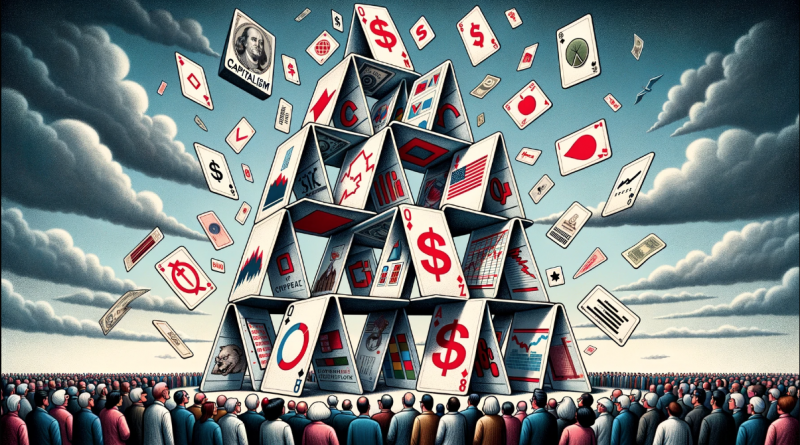Capitalism’s House of Cards: The SBF Saga, Ponzi Schemes, and the Illusion of Effective Altruism
In the inherently volatile world of private capital-based finance, the narratives of Sam Bankman-Fried (SBF) and Charles Ponzi, the mastermind behind the infamous “Ponzi scheme,” stand as stark reminders of the hidden dangers of the capitalist system. These tales, woven with the repercussions of the 2008 financial crisis and recent revelations about the corrosive influence of wealth on democratic institutions, offer a critical examination of the contradictions in capitalism and the philosophy of “effective altruism”. This article delves into their stories, shedding light on the deepening wealth inequality exacerbated by their actions and the global financial downturn.
The Arbitrage Plans of Ponzi and SBF: When Insufficient Regulations Intersect with Human Greed
Charles Ponzi: The Architect of Financial Illusion
In the early 20th century, Charles Ponzi orchestrated a scheme promising investors a 50% return on their investment within 45 days, exploiting arbitrage opportunities in international reply coupons. This venture, which gave rise to the term “Ponzi scheme,” was predicated on a continuous influx of new investors to pay the earlier ones, inevitably leading to its collapse. Ponzi’s strategy not only defrauded individual investors but also widened the wealth gap, amassing a fortune at the expense of many, and exposing the vulnerabilities and inequalities fostered by capitalism.
Sam Bankman-Fried: The Digital Era’s Arbitrage Maverick
In recent times, SBF ventured into high-risk financial strategies, leveraging the volatile cryptocurrency market ostensibly to fund altruistic initiatives. Despite his philanthropic rhetoric, the downfall of his financial empire has inflicted substantial losses on a wide array of stakeholders, including pension funds representing the life savings of numerous individuals. This episode has accentuated the wealth divide, underscoring the dangers of unchecked capitalist endeavors.
The 2008 Financial Crisis: A Reflection of Our Financial System’s Failures
In 2008, the world faced a financial crisis of unprecedented magnitude, spiraling into a global economic downturn. The U.S. government’s countermeasure, the Troubled Asset Relief Program (TARP), sought to stabilize the financial system through the acquisition of toxic assets and capital injections into banks. Although TARP prevented a total financial collapse, it has been criticized for exacerbating wealth inequality, disproportionately favoring large financial institutions while leaving many individuals grappling with home foreclosures, job losses, and financial despair.
The Undermining of Societal Well-Being and Democratic Institutions
Recent developments highlight how unrestrained and underregulated capitalism can undermine societal well-being and democratic institutions. The Citizens United decision, which allowed unlimited campaign spending by corporations and unions, has fostered a political landscape where financial power often overrides the principle of equal representation.
Furthermore, the recent disclosures about Supreme Court Justices Clarence Thomas and Samuel Alito receiving lavish gifts from billionaires underscore the detrimental influence of wealth on democratic institutions. These incidents reveal a concerning connection between wealth and power, posing a severe threat to the foundations of democratic governance.
The Vested Interests of Capitalism’s Defenders
The discourse surrounding capitalism often features staunch defense from individuals and groups with vested interests in preserving wealth. While members of both major political parties in America have engaged in behavior that protects wealthy individuals at the expense of societal progress, including Democrats like Joe Manchin and Kirsten Sinema, the conservative movement and the Republican party have been notably more egregious in this regard. This movement, encompassing figures such as Samuel Alito and Clarence Thomas, as well as the Republican party, which initiated the TARP under a Republican president, consistently advocates for policies favoring the affluent, often to the detriment of broader societal well-being. More recently, the Trump administration’s 2017 tax cuts significantly benefitted the super-rich, further illustrating the party’s alignment with policies that exacerbate wealth inequality.
Conclusion
As we stand at a pivotal moment in financial history, the stories of SBF and Charles Ponzi, intertwined with the aftermath of the 2008 financial crisis and the erosion of democratic institutions through capitalist influences, demand a critical reevaluation of the deep-seated flaws within our capital-based system and the philosophy of “effective altruism”.
These narratives urge us to scrutinize a system that recurrently prioritizes wealth accumulation over societal well-being, fostering environments where altruistic intentions are overshadowed by actions laden with ethical compromises.
It is a call to action, urging a paradigm shift towards a society grounded in ethical engagement and inclusivity, where financial strategies align with the broader goal of fostering societal prosperity and well-being. As we stand on the precipice of potential change, this vision challenges us to reject the cyclical pitfalls of a profit-driven system, urging us to forge a future where the collective good is not just a goal, but a fundamental principle that guides our actions and policies.

